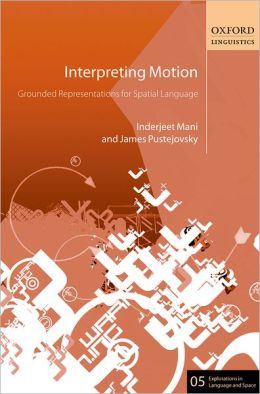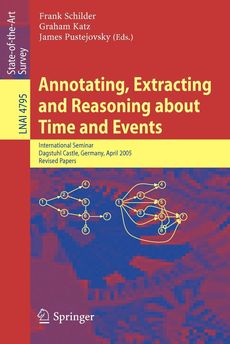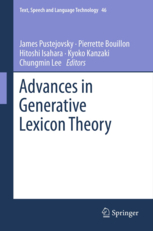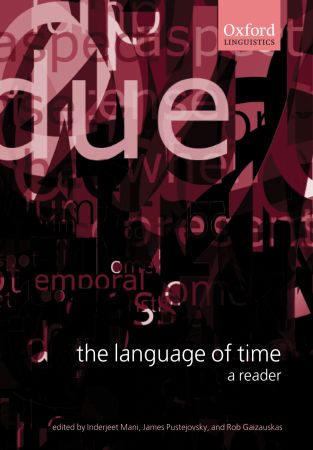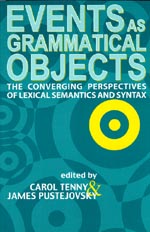Natural Language Annotation for Machine Learning
James Pustejovsky and Amber Stubbs
Create your own natural language training corpus for machine learning. Whether you’re working with English, Chinese, or any other natural language, this hands-on book guides you through a proven annotation development cycle—the process of adding metadata to your training corpus to help ML algorithms work more efficiently. Read more…
Interpreting Motion: Grounded Representations for Spatial Language
Inderjeet Mani and James Pustejovsky
Interpreting Motion presents an integrated perspective on how language structures constrain concepts of motion and how the world shapes the way motion is linguistically expressed. Natural language allows for efficient communication of elaborate descriptions of movement without requiring a precise specification of the motion. Read more…
The Generative Lexicon
James Pustejovsky
The Generative Lexicon presents a novel and exciting theory of lexical semantics that addresses the problem of the “multiplicity of word meaning”; that is, how we are able to give an infinite number of senses to words with finite means. Read more…
Annotating, Extracting and Reasoning about Time and Events
Frank Schilder, Graham Katz and James Pustejovsky
This state-of-the-art survey comprises a selection of the material presented at the International Dagstuhl Seminar on Annotating, Extracting and Reasoning about Time and Events, held in Dagstuhl Castle, Germany, in April 2005. The seminar centered around an emerging de facto standard for time and event annotation: TimeML. Read more…
Semantics and the Lexicon
James Pustejovsky
This book integrates the research being carried out in the field of lexical semantics in linguistics with the work on knowledge representation and lexicon design in computational linguistics. It provides a stimulating and unique discussion between the computational perspective of lexical meaning and the concerns of the linguist for the semantic description of lexical items in the context of syntactic descriptions. Read more…
Advances in Generative Lexicon Theory
James Pustejovsky, Pierrette Bouillon, Hitoshi Isahara and Kyoko Kanzaki
This collection of papers takes linguists to the leading edge of techniques in generative lexicon theory, the linguistic composition methodology that arose from the imperative to provide a compositional semantics for the contextual modifications in meaning that emerge in real linguistic usage. Read more…
Lexical Semantics: The Problem of Polysemy
James Pustejovsky and Branimir Boguraev
Lexical ambiguity presents one of the most intractable problems for language processing studies and, not surprisingly, it is at the core of research in lexical semantics. Originally published as two special issues of the Journal of Semantics, this collection focuses on the problem of polysemy, from the point of view of practitioners of computational linguistics. Read more…
The Language of Time: A Reader
Inderjeet Mani, James Pustejovsky and Robert Gaizauskas
This reader collects and introduces important work in linguistics, computer science, artificial intelligence, and computational linguistics on the use of linguistic devices in natural languages to situate events in time: whether they are past, present, or future; whether they are real or hypothetical; when an event might have occurred, and how long it could have lasted. Read more…
Events as Grammatical Objects: The Converging Perspectives of Lexical Semantics and Syntax
Carol L. Tenny and James Pustejovsky
Researchers in lexical semantics, logical semantics, and syntax have traditionally employed different approaches in their study of natural languages. Yet, recent research in all three fields have demonstrated a growing recognition that the grammars of natural languages structure and refer to events in particular ways. Read more…
Lexical Semantics and Knowledge Representation
James Pustejovsky and Sabine Bergler
Recent work on formal methods in computational lexical semantics has had the effect of bringing many linguistic formalisms much closer to the knowledge representation languages used in artificial intelligence. Formalisms are now emerging which may be more expressive and formally better understood than many knowledge representation languages. Read more…
Corpus Processing for Lexical Acquisition
Branimir Boguraev and James Pustejovsky
The lexicon has emerged from the study of computational linguistics as a fundamental resource that enables a variety of linguistic processes to operate in the course of tasks ranging from language analysis and text processing to machine translation. Lexicon acquisition, therefore, plays an essential part in getting any natural language processing system to function in the real world. Read more…
Studies in Generalized Binding
James Pustejovsky
No information avaliable.
Readings in the Lexicon: Interdisciplinary Perspectives
James Pustejovsky and Yorick Wilks

Pustejovsky, J. Y. Wilks, ed. Readings in the Lexicon: Interdisciplinary Perspectives. Cambridge, MA: MIT Press, 2012.
Introduction to Formal Language Theory
Robert N. Moll, Michael A. Arbib, A. J. Kfoury (with contributions by James Pustejovsky)

This volume combines “An Introduction to Formal Language ” “Theory” with issues in computational linguistics. The book begins with standard formal language material, including a discussion of regular, context-free, context sensitive, and arbitrary phrase structure languages. This is followed by a discussion of the corresponding families of automata: finite-state, push-down, linear bounded and Turing machines. Read more…



